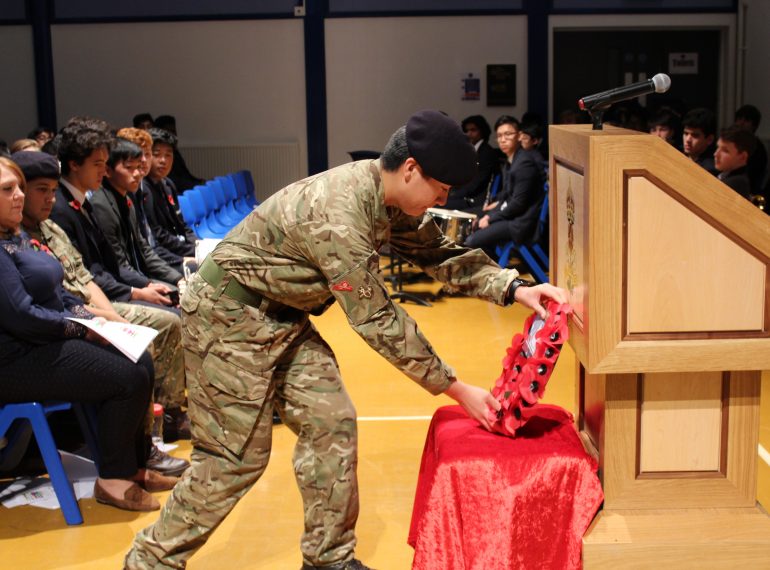
All pupils in Years 7–10, staff and some senior boys joined together in the Shearly Hall for a special remembrance assembly to mark the centenary of the Armistice in 1918.
The Headmaster, Neil Enright, read aloud the names of the 48 Old Elizabethans killed during World War I, whilst the names of the 65 who died in World War II were projected on to a screen.
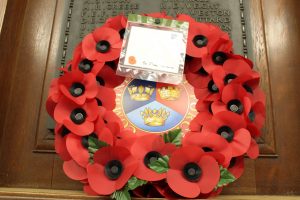 The ceremony featured music, poetry and a procession by the School’s Combined Cadet Force (CCF). The silence at 11 o’clock was heralded by six of QE’s senior trumpeters sounding the Last Post; they played Reveille to signal the end of the silence.
The ceremony featured music, poetry and a procession by the School’s Combined Cadet Force (CCF). The silence at 11 o’clock was heralded by six of QE’s senior trumpeters sounding the Last Post; they played Reveille to signal the end of the silence.
The two-minute silence was also observed separately by Years 11–13, although many were in fact involved in the assembly, whether as readers, musicians or members of the CCF.
At the end of the assembly, the CCF contingent marched with the commemorative wreath to the War Memorial located in the Crush Hall, where it was placed.
The Headmaster said afterwards: “This remembrance assembly was a fitting commemoration. It is important for the boys to understand fully the significance of this centenary and to reflect upon the service and sacrifice rendered by their forebears.”
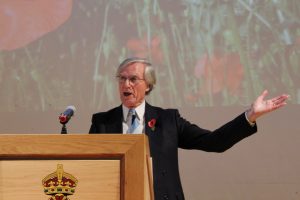 In an address to the assembly, Old Elizabethan and Governor Ken Cooper (1942-50), a former officer in the Royal Warwickshire Regiment, charted the course of the war, making clear the scale of the conflict and its great cost. He explained how the emergence of trench warfare on the Western Front led to combat that lasted for months and years yet resulted in minimal or no territorial gains for either side.
In an address to the assembly, Old Elizabethan and Governor Ken Cooper (1942-50), a former officer in the Royal Warwickshire Regiment, charted the course of the war, making clear the scale of the conflict and its great cost. He explained how the emergence of trench warfare on the Western Front led to combat that lasted for months and years yet resulted in minimal or no territorial gains for either side.
Prior to the introduction of conscription in 1916, some 2.5m Britons had volunteered to fight. Participants from many nations sacrificed themselves in the service of the greater good of their communities and home countries. And although there were, of course, many instances of heroism, Mr Cooper said World War I was less about such individual acts than about the huge numbers of ordinary people making the ultimate personal sacrifice in service. He spoke about the importance of remembering, quoting Churchill’s maxim: “A nation that forgets its past has no future,”, which he related to the boys’ understanding of the School’s own history.
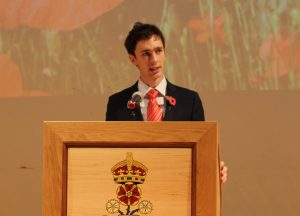 The assembly, which took place on Friday, was organised and compèred by English teacher, Micah King, an Extra-curricular Enrichment Tutor. He began with these words: “Welcome to this assembly to commemorate Remembrance Day. In almost exactly 48 hours’ time, it will be the 11th hour, of the 11th day, of the 11th month.
The assembly, which took place on Friday, was organised and compèred by English teacher, Micah King, an Extra-curricular Enrichment Tutor. He began with these words: “Welcome to this assembly to commemorate Remembrance Day. In almost exactly 48 hours’ time, it will be the 11th hour, of the 11th day, of the 11th month.
“At that time, 100 years ago, the First World War finally came to an end. It was an Armistice, a peace agreement, signed a few hours earlier in a railway carriage in France, that ended four long years of hostilities. Millions had died. Millions more were wounded. And even those who did not directly take part in the fighting, had to endure heartache and grief, as men and women from around the globe fought, and suffered, and died; and the world changed forever.
“Yet amidst the suffering, heroes on both sides of the battlefield risked their lives and safety for their countries. Incredible acts of courage, dedication and service were witnessed both on the battlefield and on the home front, and today, we will remember and honour those who sacrificed so much for so many.”
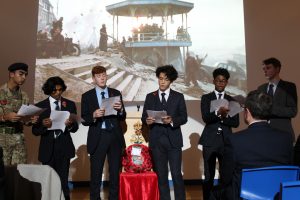 The assembly featured:
The assembly featured:
- A recording of Estonian composer Arvo Pärt’s reflective 1978 piece, Spiegel im Spiegel
- A poem written especially for the occasion by sixth-former Rivu Chowdhury
- School Captain Aashish Khimasia recounting the heroic actions on the battlefield in 1917 that led to Old Elizabethan Acting Captain Allastair McReady-Diarmid being posthumously awarded the Victoria Cross
- The Senior Wind Ensemble performing John William’s Hymn to the Fallen, conducted by Year 13 pupil Binu Perera
- Binu then reading perhaps the most famous single poem from the extensive World War I corpus, John McCrae’s In Flanders Field
- The Barbershop Group performing the hymn, Dear Lord and Father of Mankind, during which a scene from the film, Atonement, was shown, which captured a moment on the Dunkirk beaches in 1940.
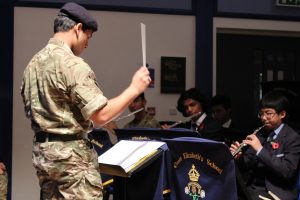 Before the retiring procession to the accompaniment of Israel Kamakawiwo’ole’s version of Somewhere Over the Rainbow, Mr King said that if the boys would use their “gifts and talents as leaders to share the message of peace, then that would fill me with a deep sense of hope and optimism for the future”.
Before the retiring procession to the accompaniment of Israel Kamakawiwo’ole’s version of Somewhere Over the Rainbow, Mr King said that if the boys would use their “gifts and talents as leaders to share the message of peace, then that would fill me with a deep sense of hope and optimism for the future”.
The assembly concluded with the School Prayer, which includes the following supplication: “Inspire us, O Lord, so to do our work today that, even as we are being helped by the remembrance of the loyal lives of those who came before us, so our faithfulness in thy service may aid those who shall take our places.”
